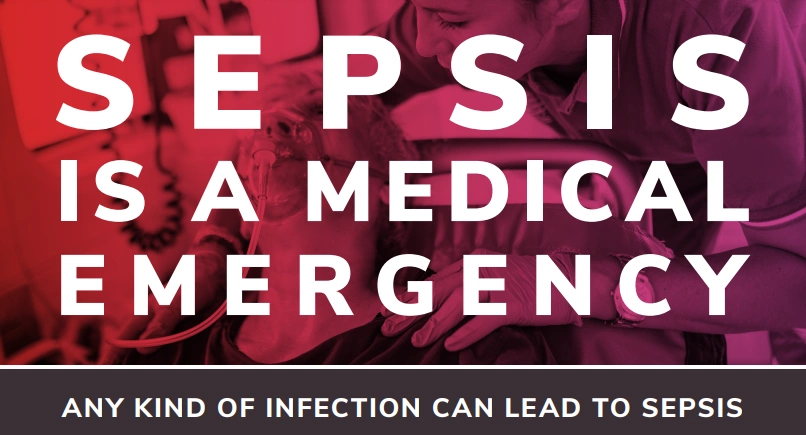September is Sepsis Awareness Month

Most, if not all of us, have heard the term Sepsis, but how many people really know what Sepsis is? September is Sepsis Awareness Month. Let’s take a deeper look at what sepsis is, who is at risk for sepsis, and how to recognize the signs and symptoms of sepsis.
What Is Sepsis?
The CDC defines sepsis as: the body’s extreme response to an infection. It is a life-threatening medical emergency. Sepsis happens when an infection you already have triggers a chain reaction throughout your body. Without timely treatment, sepsis can rapidly lead to tissue damage, organ failure, and death. Sepsis is not the infection itself; rather it is the body’s response to an infection that damages its own tissues. Bacterial infections are the most common cause of sepsis, but viral infections such as Covid and pneumonia can lead to sepsis as well. You can’t “catch sepsis” as Sepsis is not a contagious disease. However, if the infection that caused the sepsis is contagious you can pass along the root infection.
Who Is At Risk For Developing Sepsis?
Sepsis affects 1.7 million people and takes 350,000 adult lives in the U.S. every year. Every 20 seconds someone in the US is diagnosed with sepsis and every two minutes a life is lost. 1 in 3 patients who die in the hospital have sepsis. Eighty percent (80%) of all sepsis patients are over the age of 50. People with chronic medical conditions, such as diabetes, lung disease, cancer, and kidney disease are at higher risk, as are people with weakened immune systems. People with recent severe illness or hospitalization are at higher risk as are previous sepsis survivors. Finally, children younger than one are at higher risk of developing sepsis.
How To Recognize Sepsis
Someone with sepsis is extremely ill. They may have extreme pain, discomfort, and shortness of breath. They may seem disoriented and confused or sleepy and difficult to arouse. Someone who is septic may have a temperature that is higher or lower than normal; they may be clammy or sweaty. Their heart rate may be elevated, and their blood pressure may be low. A medical assessment by a healthcare professional is needed to confirm sepsis.
Catching sepsis early is the key to survival. As many as 80% of sepsis deaths could be prevented with early detection and treatment. Mortality from sepsis increases as much as 8% for every hour treatment is delayed. Treatment with IV antibiotic and IV fluids should begin as quickly as possible. IV medications called vasopressors may be needed to improve and sustain blood pressure and at times surgery may be needed to remove damaged tissue.
Knowing what to look for and getting rapid treatment can save lives. For more information visit the Sepsis Alliance.
At Haven Healthcare Advocates our advocates can communicate with hospital staff daily to check on you or a loved one. While we do not give medical advice or provide nursing care, we do make sure that you have and understand all the healthcare information you need to make the best and most informed decisions for you or a loved one’s care. To find out more click here or schedule a consultation.

